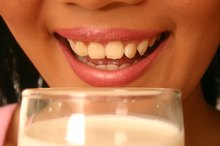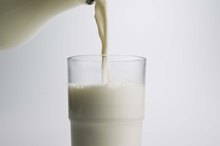Drinking Whole Milk During Pregnancy
During pregnancy, your body needs extra nutrition to support your developing baby's growth, and drinking whole milk can be a way to meet some of those needs. In general, milk provides plenty of nutrients to help support your baby's development, and drinking milk during pregnancy may provide long-lasting health benefits. While whole milk has more calories and saturated fat than reduced-fat milk or skim milk, the specific benefits of whole milk may offset these potential disadvantages for some women.
Calcium and Pregnancy
If you are 24 or older, you need a total of about 1,200 milligrams of calcium per day when you're pregnant, according to the Cleveland Clinic. Pregnant women younger than 24 need between 1,200 and 1,500 milligrams a day. If you don't get enough dietary calcium while pregnant, your body may take calcium from your bones to meet your baby's needs. Consuming four servings of dairy, such as milk, yogurt or cheese, can help you meet your calcium needs. Whole milk contains 276 milligrams of calcium per cup, so it can contribute to your calcium intake.
- If you are 24 or older, you need a total of about 1,200 milligrams of calcium per day when you're pregnant, according to the Cleveland Clinic.
- Whole milk contains 276 milligrams of calcium per cup, so it can contribute to your calcium intake.
Vitamin D in Whole Milk
Daily Milk Intake for a Pregnant Woman
Learn More
Whole milk is typically fortified with vitamin D, an essential nutrient 6. A study published in the "Annals of Neurology" in 2011 found that maternal consumption of milk products with vitamin D during pregnancy helped reduce the risk of multiple sclerosis in the child 4.
DHA Fortified Milk
Some whole milk in the United States is fortified with DHA, an essential fatty acid that is actively incorporated into the developing fetal brain during the last few months of pregnancy. According to a study published in 2013 in the "American Journal of Clinical Nutrition," DHA in the mother's diet might boost fetal brain development and affect IQ in the child 12. Only whole milk and 2 percent milk can be fortified with DHA because it is part of the fat content of the milk. This may be especially important for pregnant women who cannot or do not eat much fish, another major source of dietary DHA.
- Some whole milk in the United States is fortified with DHA, an essential fatty acid that is actively incorporated into the developing fetal brain during the last few months of pregnancy.
- According to a study published in 2013 in the "American Journal of Clinical Nutrition," DHA in the mother's diet might boost fetal brain development and affect IQ in the child 1.
Long-Term Benefits of Milk
How Does Milk Affect Teens?
Learn More
Whether you choose whole milk or a lower-fat variety, consuming any type of milk during pregnancy might help ensure a healthy birth weight and could contribute to more height in adulthood, according to a study in the "European Journal of Clinical Nutrition." In the study, children of mothers who drank more than 150 milliliters of milk per day, or about 2/3 of a cup of milk, were taller on average at age 20 than the children of mothers who consumed less milk during pregnancy.
Related Articles
References
- American Society for Nutrition: The Milk Debate
- The American Journal of Clinical Nutrition: Maternal Fatty Acids in Pregnancy, Fads Polymorphisms, and Child Intelligence Quotient at 8 Years of Age
- European Journal of Clinical Nutrition: Maternal Milk Consumption, Birth Size and Adult Height of Offspring: A Prospective Cohort Study With 20 Years of Follow-up
- Annals of Neurology: Gestational Vitamin D and the Risk of Multiple Sclerosis in Offspring
- Cleveland Clinic: Increasing Calcium in Your Diet During Pregnancy
- USDA National Nutrient Database: Milk, Whole, 3.25% Milkfat, with Added Vitamin D
- Milk, reduced fat (2%). FoodData Central. U.S. Department of Agriculture. Published April 1, 2019.
- Månsson HL. Fatty acids in bovine milk fat. Food Nutr Res. 2008;52. doi:10.3402/fnr.v52i0.1821
- Wadolowska L, Sobas K, Szczepanska JW, Slowinska MA, Czlapka-Matyasik M, Niedzwiedzka E. Dairy products, dietary calcium and bone health: possibility of prevention of osteoporosis in women: the Polish experience. Nutrients. 2013;5(7):2684-707. doi:10.3390/nu5072684
- Varenna M, Manara M, Galli L, Binelli L, Zucchi F, Sinigaglia L. The association between osteoporosis and hypertension: The role of a low dairy intake. Calcif Tissue Int. 2013;93(1):86-92. doi:10.1007/s00223-013-9731-9
- Cormick G, Ciapponi A, Cafferata ML, Belizán JM. Calcium supplementation for prevention of primary hypertension. Cochrane Database Syst Rev. 2015;(6):CD010037. doi:10.1002/14651858.CD010037.pub2
- National Cancer Institute. Calcium and cancer prevention. Updated May 4, 2009.
- Radavelli-Bagatini S, Zhu K, Lewis JR, Dhaliwal SS, Prince RL. Association of dairy intake with body composition and physical function in older community-dwelling women. J Acad Nutr Diet. 2013;113(12):1669-74. doi:10.1016/j.jand.2013.05.019
- Josse AR, Tang JE, Tarnopolsky MA, Phillips SM. Body composition and strength changes in women with milk and resistance exercise. Med Sci Sports Exerc. 2010;42(6):1122-30. doi:10.1249/MSS.0b013e3181c854f6
- Rautiainen S, Wang L, Lee IM, Manson JE, Buring JE, Sesso HD. Dairy consumption in association with weight change and risk of becoming overweight or obese in middle-aged and older women: a prospective cohort study. Am J Clin Nutr. 2016;103(4):979-88. doi:10.3945/ajcn.115.118406
- Flom JD, Sicherer SH. Epidemiology of cow's milk allergy. Nutrients. 2019;11(5). doi:10.3390/nu11051051
Writer Bio
Bridget Coila specializes in health, nutrition, pregnancy, pet and parenting topics. Her articles have appeared in Oxygen, American Fitness and on various websites. Coila has a Bachelor of Science in cell and molecular biology from the University of Cincinnati and more than 10 years of medical research experience.









